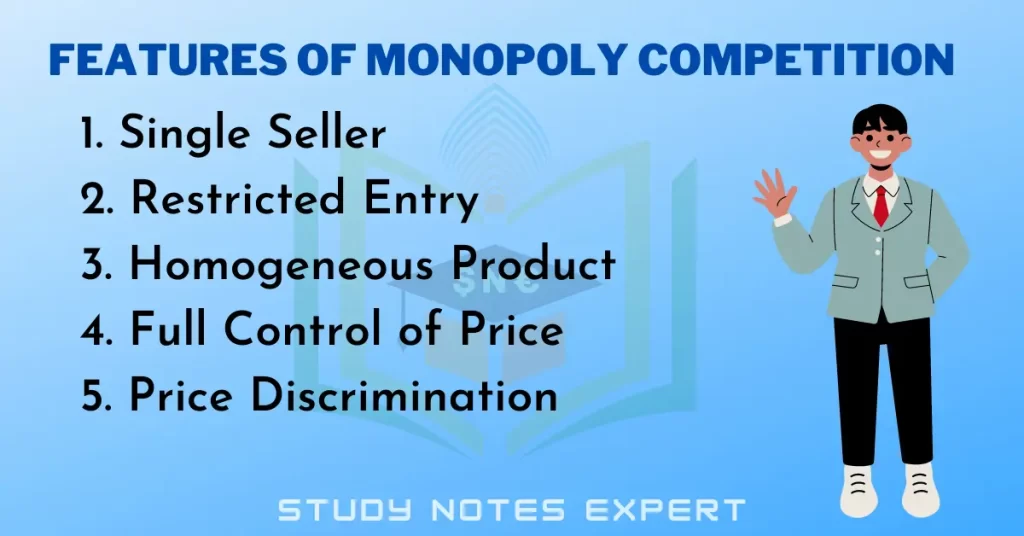A market situation with only one seller and barriers for others to enter, products having no close substitute, cross elasticity of demand is low with every other product and no other firm producing an identical product is called a monopoly market. Having control over the price, a monopolist can sell his product at the price of his choice.
The monopolist fixes the prices at which he will sell his product, but at the same time, he cannot determine the amount of the commodity that the buyer will buy. His price charging is inversely proportional to the demand for his commodity. Hence, the price is entirely under the control of the monopolist but no control over the demand that the purchaser determines.
Definition of Monopoly Market
Ferguson and Kreps say, “A pure monopoly market exists when one and only one firm produces or sells the commodity in question. In other words, a monopoly is a one-firm industry.”
According to A. Koutsoyiannis, “Monopoly is a market situation in which there is a single seller, there are no close substitutes for the commodity it produces, there are barriers to entry.”
Outstanding Features of Monopoly Competition

The features of monopoly market are as follows:
1. Single Seller
A single producer of a particular commodity or service in a monopoly market gathers many buyers, who can be an individual, a group of partners, a joint stock company or a state. It is the sole supply source for goods and services having no close substitute. The market is referred to as a ‘pure monopoly market’ as this market structure is where the firm is the industry. It is instead a theoretical concept as sometimes there emerge close substitutes by manufacturers who hold significant market share, leading to an imperfect form of the market, which is highly termed as monopolistic competition.
2. Restricted Entry
There is a restriction on the free entry of new organizations, as new sellers cannot enter the monopoly market. The following are the primary barriers restricting the entry of new sellers:
i) Government license or franchise.
ii) Patents and copyrights.
v) Decreasing average total cost.
1) Resource ownership.
iv) High start-up cost.
3. Homogeneous Product
The product produced by the monopoly company has no comparable product that is also a uniform item. The customer is compelled to buy the product offered at the labelled price. In the case of the railway, being the only bulk carrier, there is no alternative. To achieve it, a seller must develop a specific product to stand alone in a monopolistic setting-up. It is one of the important features of monopoly.
4. Full Control of Price
The characteristics of a monopoly market, where new buyers and sellers cannot enter, restrict competition, and the monopolist entirely influences the market’s conditions. Thus, monopoly-free companies are free of price pressure and can charge according to advantage, aiming to maximise profit via an established quantity. Thus, a monopolist is a “price maker” instead of a “price taker” who decides on the price acceptable to the purchasers. However, to avoid the entry of new market participants, the business must control the fixed price for its product or service, which is in the context of the monopoly theory.
5. Price Discrimination
Price discrimination involves charging different prices for the same goods or services from different buyers. The monopolist can be in the market by discriminating the prices as per his convenience. It is the essential features of monopoly.
5+ Advantages of Monopoly in Market

The following are the advantages of monopoly:
1. Research and Development
Funding of high-cost capital investment spending is through supernormal profits, which helps improve products and lower the costs in the long term by using successful research, e.g. Telecommunications and Pharmaceuticals.
2. Economies of Scale
Monopolies are more efficient than smaller firms as they can produce at lower costs, increasing the output and decreasing the average production cost. It is one of the advantages of monopoly. Consumers receive this in the form of lower prices.
3. Competition for Corporate Control
Financial market discipline is an essential requirement for monopolies. If potentially low-cost monopolies fail to perform, then it is liable to be taken over by a bid.
4. Stability of Prices
Mostly, the prices in the monopoly market are stable because only one firm is involved in the market, which fixes the price. But in other structures of the market, the prices are unstable and elastic due to the existence of competition, but it does not exist in the monopoly market.
5. Source of Revenue for the Government
Monopoly firms give vast amounts of money, which the government receives as tax.
6. Massive Profits
The absence of competitors results in many sales monopoly firms inclining to receive high profits from their operations. Sellers use these profits in the introduction of other products. They are carrying out research and development, which are many among those that are beneficial to the firm.
Top 5 Disadvantages of Monopoly in Market

The following are the disadvantages of monopoly:
1. Exploitation of Consumers
A monopoly market is known for exploiting consumers with no products for competition, and the consumer deals crudely in quantity, quality and pricing. Inferior or sub-standard goods are quickly produced by the firm depending on its choice, as customers will purchase them at the end of the day due to a lack of competing products in the market that is already available.
2. Dissatisfied Consumers
Due to compromise in quality, consumers will be dealt with rudely by a monopoly market. Hence, it is self-evident that unsatisfied consumers complain about the products the firms produce. It is one of the disadvantages of monopoly.
3. Higher Prices
Due to a lack of competition in the market, no price war benefits the consumer, and as a result, monopoly firms are free to charge high prices for goods and services.
4. Price Discrimination
Price discrimination is a practice in monopoly firms where different prices are charged for the same product from different consumers.
5. Inferior Goods and Services
Due to the absence of competition, monopoly firms produce inferior goods and services as they know marketers will sell the goods. One of the disadvantages of monopoly is this.
What is Monopoly Market and its Features?
A monopoly is a market with a single seller (known as the monopolist) and many buyers. The monopolist has complete control over the market and sets the prices of his or her products.
Monopoly markets have the following characteristics:
1. There is only one firm in the market.
2. The firm has complete control over the market and sets prices.
3. There are no close substitutes for the products offered by the monopolist.
4. Buyers have no bargaining power.
What are 5 Examples of Monopolies?
There are many examples of monopolies in the real world. Some examples include:
1. Google
2. Apple
3. Microsoft
4. Amazon
5. AT&T
What are the Four Main Causes of Monopoly?
The four main causes of monopoly are:
1. Economies of Scale
2. Barrier to Entry
3. Product Differentiation
4. Government Intervention.

